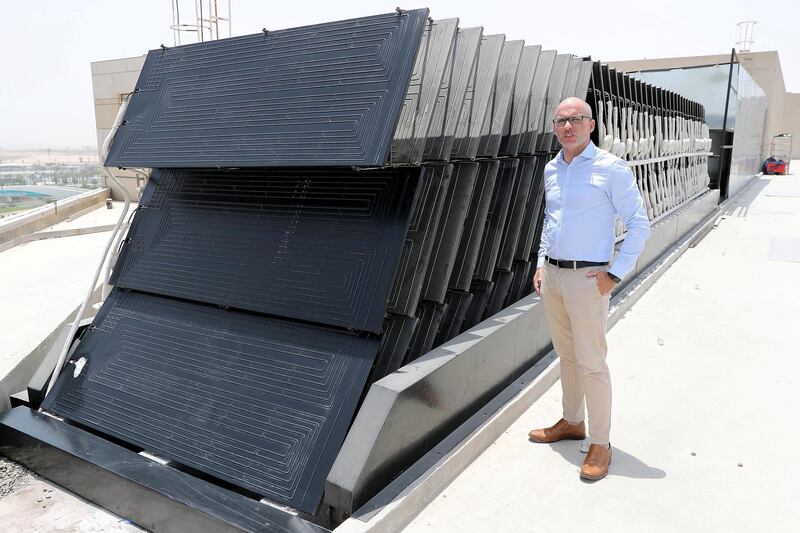A new era of green energy is under way in the UAE as an Abu Dhabi hotel became the first in the GCC to have its water 100 per cent heated by solar energy.
Expensive gas or diesel boilers and electric heaters could become a thing of the past, judging by the success of the renewable alternatives installed on to the roof of the Radisson Blu hotel at Yas Island in April.
Costs of running the entire hotel’s hot water supply have been slashed by 85 per cent, from a compact solar installation capable of heating 45,000 litres of water a day.
“The technology has been used for years, but this is the first hotel to take on the technology in the GCC,” said Hugo Domingues, business director at Energie GCC.
“There are many problems facing solar thermal technology in this region. It should be booming here, but it isn’t.
“These solar water heaters could transform the way the environment is used to reduce costs for businesses, and reliance on traditional fuels.
“Many hotels don’t have the space to install regular solar panels, so use solar for just a percentage of their heating or power. This system changes that.”
Heat from the sun’s radiance, wind and environment is absorbed by panels and used to heat water distributed within a water system.
On average, a three-star hotel requires about 40 litres of hot water a day per guest, while a four-star hotel needs 50 to 60 litres of water heated daily per person.
The very best five-star hotels heat 80 to 100 litres of water every day for guests – a considerable business expense.
That expense, on average, can be about Dh300,000 a year but is reduced to about Dh54,000 using solar thermodynamic technology – an 84 per cent saving on hot water costs.
The savings could one day lead to lower room rates for guests.
The space required for panels is also less, making them easier to install and more practical. The panels heating water at the Radisson Blu in Yas take up just 31 square metres, whereas other solar systems to generate a similar supply would cover about 350 sq metres.
Developers claim the equipment and installation costs will be paid for in just two years.
_________________
Read more:
Opening date set for Jumeirah's Saadiyat Island resort
UAE looks to create hundreds of thousands of jobs in renewable sector
_________________
Panels are coated with a protective layer usually used on boats, making them last longer than conventional solar panels when exposed to the harsh desert environment.
“Solar systems seem to be the perfect choice in the UAE, but in fact they aren’t implemented on a grand scale, especially in hotels,” Mr Domingues said.
“Our technology allows to adapt to the available space, occupying much less area.”
The technology could offer a boost to the renewable energy industry in the UAE, that aims to source 44 per cent of power from renewables and nuclear by 2050.
Jobs in the renewable energy industry worldwide hit 10.3 million in 2017 – a 5.3 per cent increase on 2016.
As the UAE moves towards more renewable energy sources, 100,000 jobs could be created in the industry by 2030.
Other buildings to begin using thermodynamic solar energy shortly are the Jumeirah at Saadiyat Island resort due to open in November, and the Danat Al Emarat Women and Children’s Hospital in Abu Dhabi.







